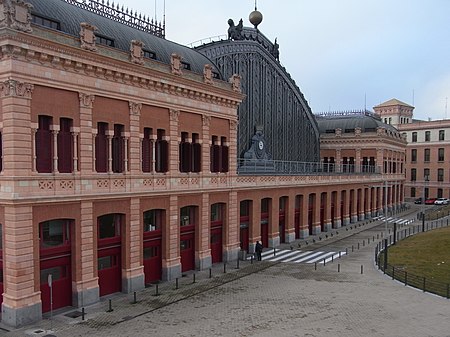Madrid Atocha railway station

Madrid Atocha (Spanish: Estación de Madrid Atocha), also named Madrid Puerta de Atocha, is the largest railway station in Madrid. It is the primary station serving commuter trains (Cercanías), regional trains from the south and southeast, intercity trains from Navarre, Cádiz and Huelva (Andalusia) and La Rioja, and the AVE high speed trains from Girona, Tarragona and Barcelona (Catalonia), Huesca and Zaragoza (Aragon), Sevilla, Córdoba, Málaga and Granada (Andalusia), Valencia, Castellón and Alicante (Levante Region). These train services are run by the Spanish national rail company, Renfe. As of 2019, this station has daily services to Marseille in France.
Excerpt from the Wikipedia article Madrid Atocha railway station (License: CC BY-SA 3.0, Authors, Images).Madrid Atocha railway station
Intercambiador de Atocha, Madrid Arganzuela (Arganzuela)
Geographical coordinates (GPS) Address Nearby Places Show on map
Geographical coordinates (GPS)
| Latitude | Longitude |
|---|---|
| N 40.406528 ° | E -3.689373 ° |
Address
Atocha Renfe
Intercambiador de Atocha
28014 Madrid, Arganzuela (Arganzuela)
Community of Madrid, Spain
Open on Google Maps











